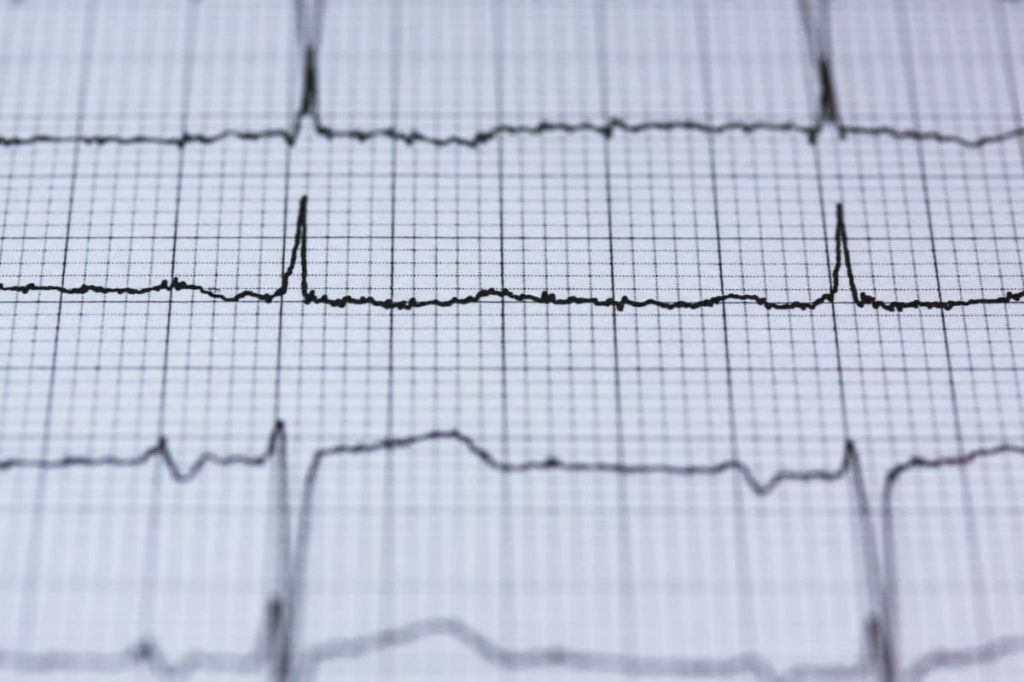Electrocardiography (ECG)
The heart is one of the most important organs in the human body. It provides for blood circulation, and the human health depends to a large extent on its normal functioning. Therefore, it is necessary to undergo periodic investigations allowing to assess its condition and reveal timely signs of various pathologies.
An Electrocardiography or ECG, as it is called in the abbreviated form, is the most widespread type of examining the condition of the heart. This is a valuable method for diagnosing cardiovascular diseases, which is based on measurement of electric field fluctuations of the cardiac muscle. The ECG is performed using an electrocardiograph, which records change in cardiac electric pulses on the paper medium (tape of the electrocardiogram) or the monitor in the form of a graph, i.e. the curve with waves. This device is a signal receiving and recording unit with a set of leads electrodes, which are applied onto the patient’s body, i.e. the extremities and the chest. The standard ECG uses six leads, these are sufficient usually to diagnose most heart pathologies.
The extended ECG uses 12 leads (six additional electrodes are applied on the chest). Such a procedure allows to obtain a more detailed picture of the heart functioning.

But this method has certain restrictions. E.g., the ECG cannot reveal all heart diseases:
- it does not diagnose directly tumors or some valvular defects;
- hemodynamics is not reflected;
- cardiac murmurs are not recorded;
- a longer procedure (Holter monitoring) is often required for a more accurate diagnosis;
- recording the electrocardiogram under stress may be required to make a diagnosis (because the symptoms do not manifest at rest).
Indications for ECG
The ECG helps to make a diagnosis in the following cases:
- congenital heart diseases and cardiac muscle enlargement;
- different arrhythmias;
- heart damage caused by arterial occlusion;
- cardiac blood supply disorders;
- cardiac inflammation;
- myocardial infarction.
An ECG in patients with myocardial infarction is the main examination method which allows to make a diagnosis and start the treatment as soon as possible. The ECG at Meditsina Clinic is done using a new method of dispersion mapping. The method allows to reveal signs of an infarction at early stages and prevent its development.
The ECG is performed:
- before any surgeries;
- in case of expert assessment for fitness for some or other profession (pilots, drivers, seamen, etc.);
- in patients with diseases of internal organs, the nervous system and other conditions if complications and involvement of the cardiovascular system in the pathologic process are suspected;
- after infections;
- if the condition of the patient with cardiovascular diseases worsens;
- if heartache, dyspnea, arrhythmia develop.
In order to obtain the important information on the heart, regular ECG is also necessary to the persons of risk groups:
- pregnant women;
- smokers;
- men aged over 40 years;
- patients with hypercholesterolemia and hypertension.
Contraindications
There are no direct contraindications for the ECG. But the procedure is not recommended if the patient has complex a thoracic injury, inflammatory disease of the thoracic skin, etc. The stress ECG is not recommended in patients with acute infectious diseases, coronary heart disease, in the acute period of the myocardial infarction and in other similar cases.
How Is Electrocardiography Done?
A standard ECG is a very short procedure. Some diseases, e.g. arrhythmia, may not be manifested during this time. ECG monitoring according to the Holter method is used in this case.
The method consists in recording the ECG continuously for 24 hours or longer. For this purpose, the patient carries around a portable electrocardiographic device. Continuous recording does not hinder the patient’s usual lifestyle or work. The only one requirement is to keep a diary during the procedure indicating various types of activities. It is also necessary to record the time when discomfort in the heart region develops. When analyzing the electrocardiogram, the physician will compare these records with the graph.
Holter monitoring is one of the most effective diagnostic methods for the patients with cardiac rhythm disorders and ischemia.
Diagnostics
Not recording the parameters of the heart functioning itself but interpretation of obtained results is the most important in electrocardiography. Our specialists perform the ECG with interpretation because a correct reading of the electrocardiogram guarantees accurate diagnosis. When you seek medical attention at our Clinic, you will receive the accurate information on functioning of your heart.
Benefits of Doing ECG at JSC «Medicine» (clinic of academician Roytberg) in Moscow
Do you have to undergo an ECG in Moscow? Visit our Center! Meditsina Clinic has been fitted out with modern diagnostic equipment for investigation of the heart condition including electrocardiographs of the latest generation. Our specialists perform the ECG using different methods, from a standard ECG to Holter monitoring.
The quality of medical services provided by our Clinic is at the same level as that at leading Israeli, German, Swiss healthcare facilities. Assessment of the condition of your heart, performing additional investigations, making a diagnosis and prescribing the treatment—all these components are in the hands of the best specialists-cardiologists with many years of experience. Additionally, consultations with foreign Doctors are conducted regularly. And the price for electrocardiography is much lower at our Clinic than at similar foreign clinics not to mention the fact that you save the money for travelling abroad.
Doctors













